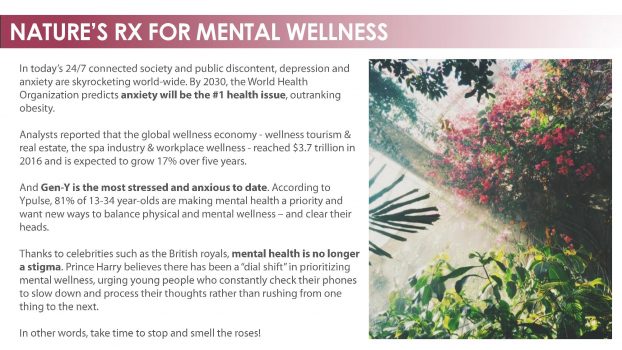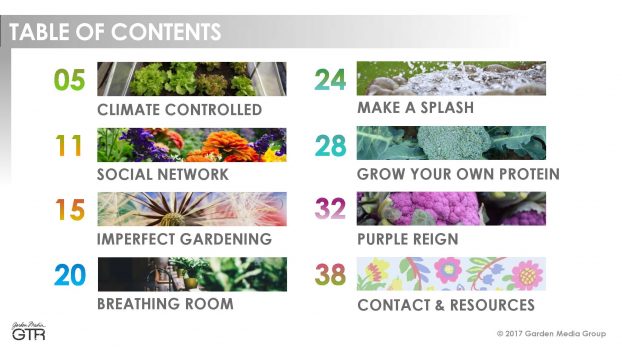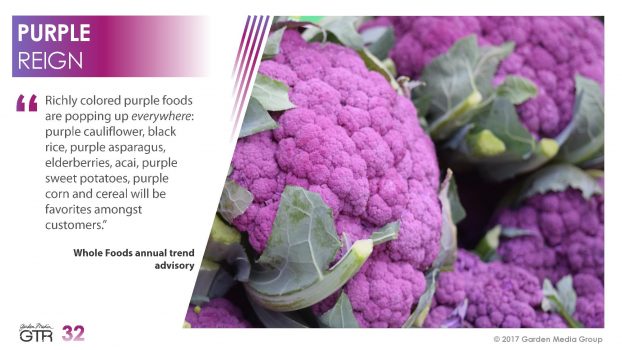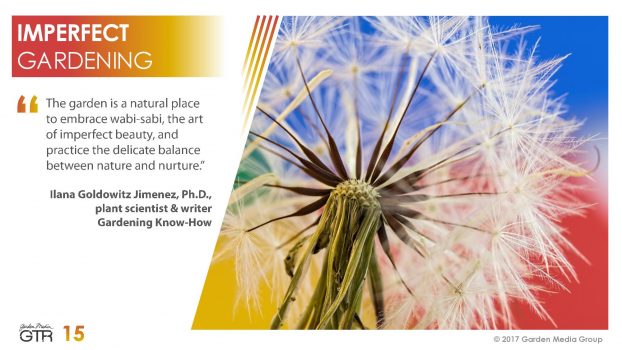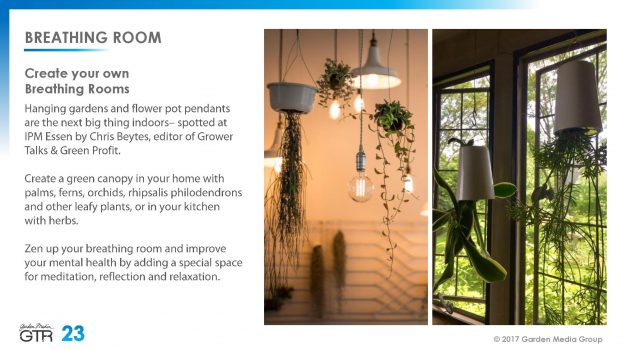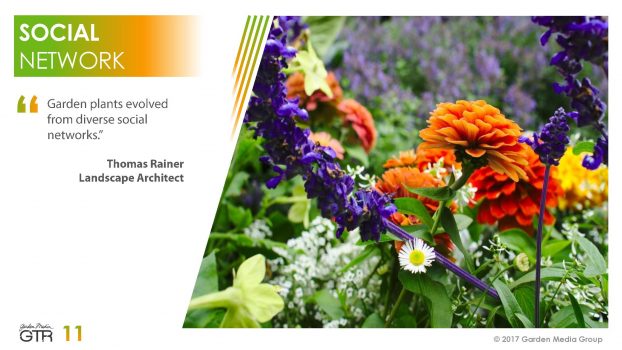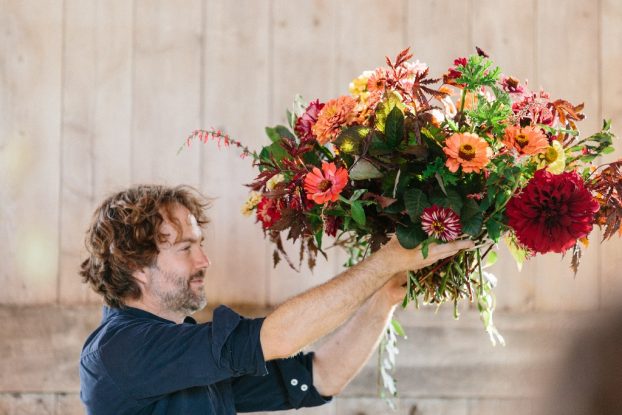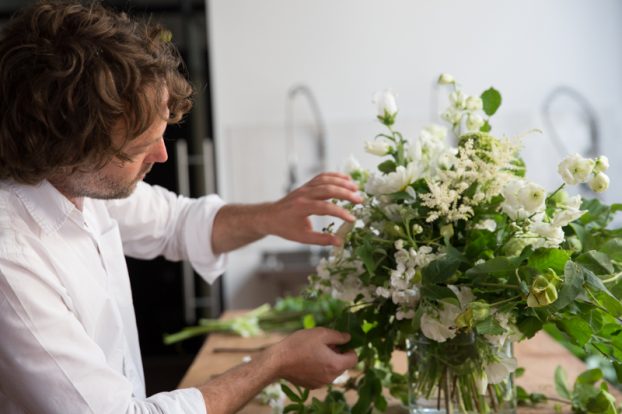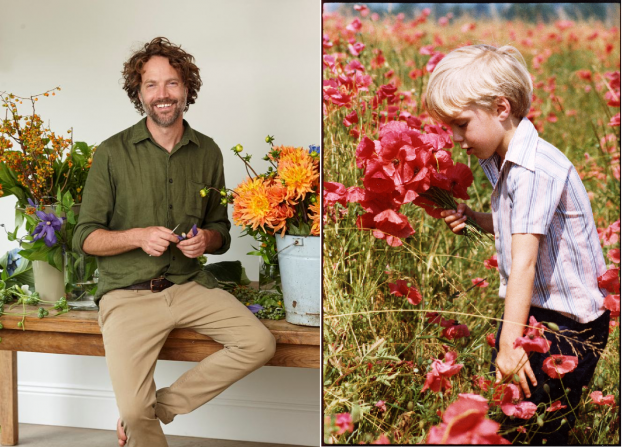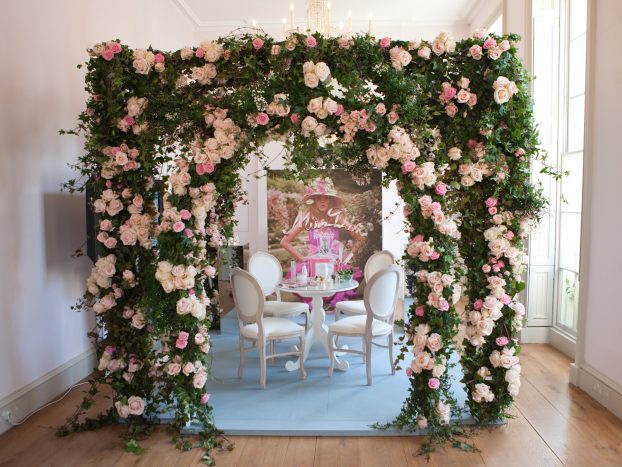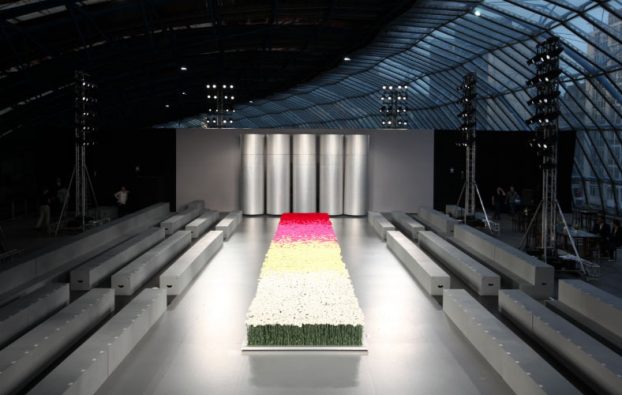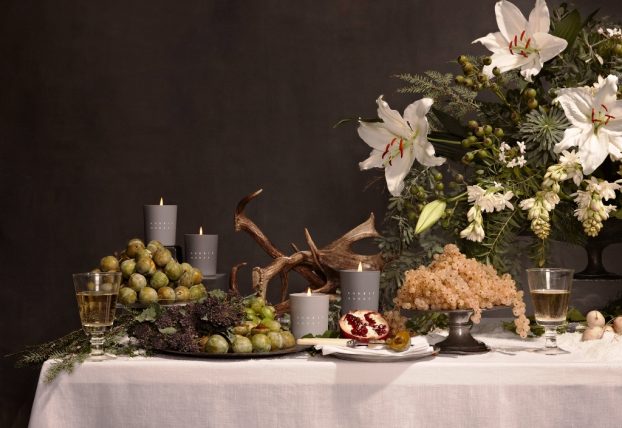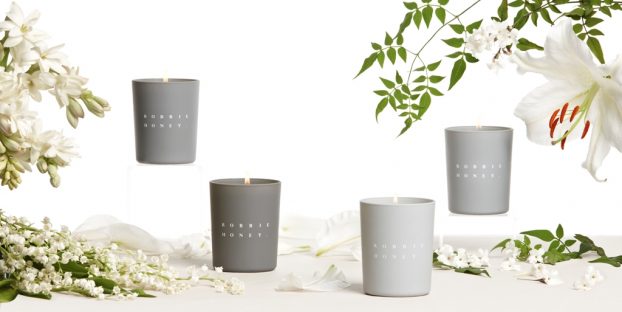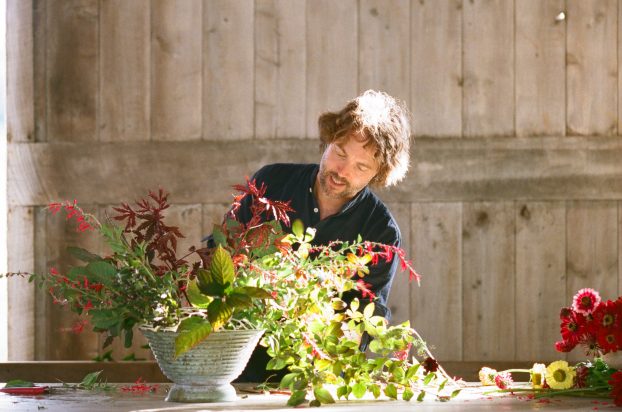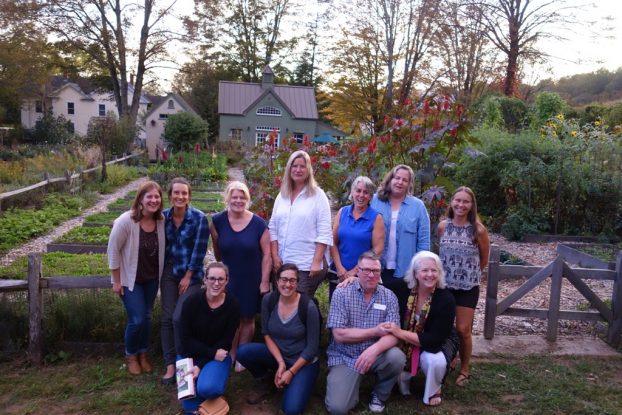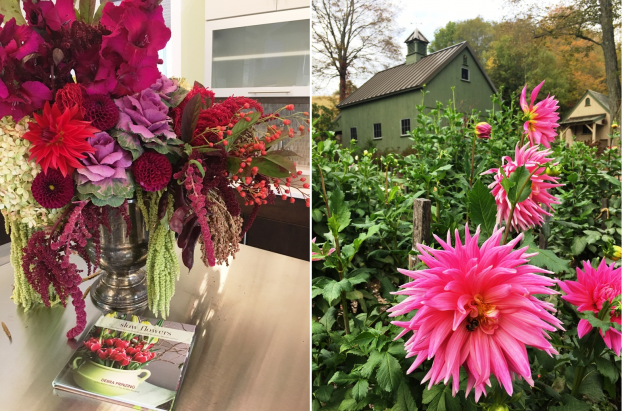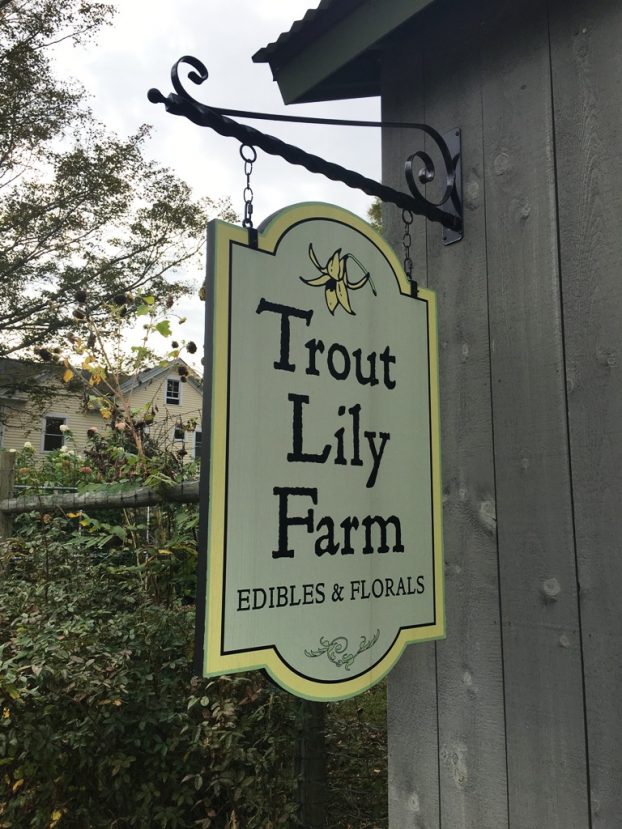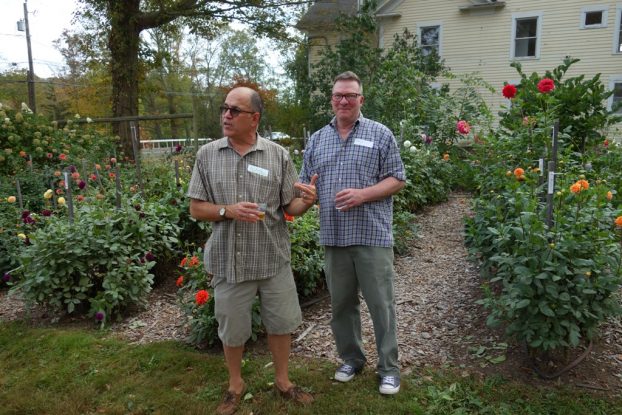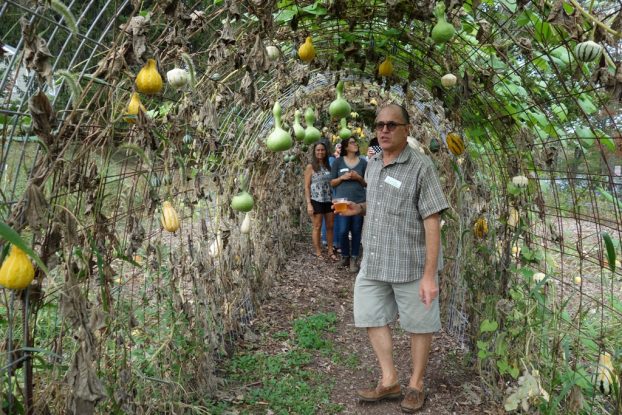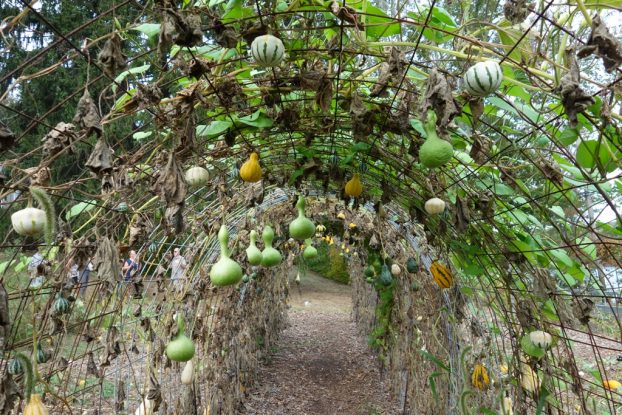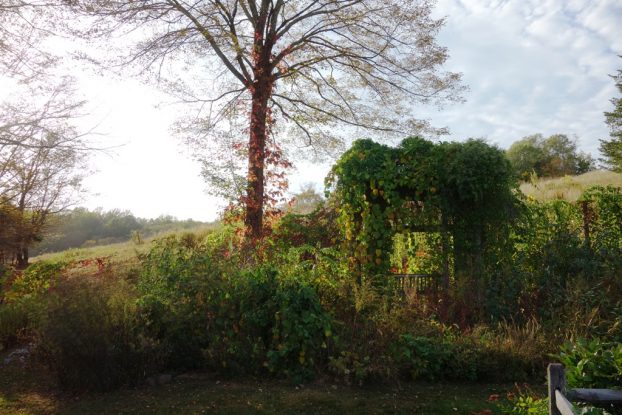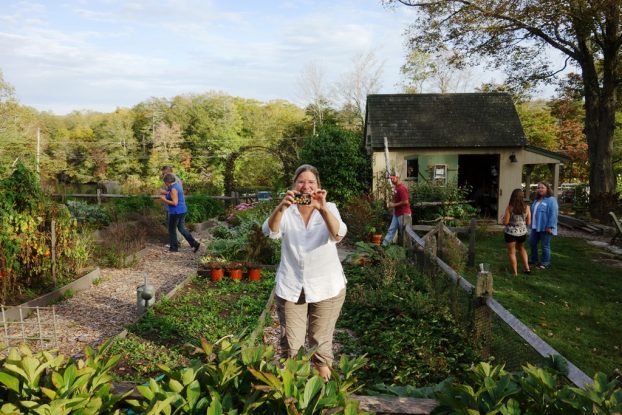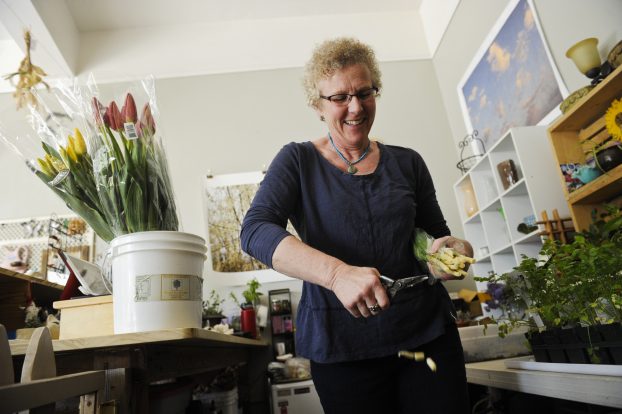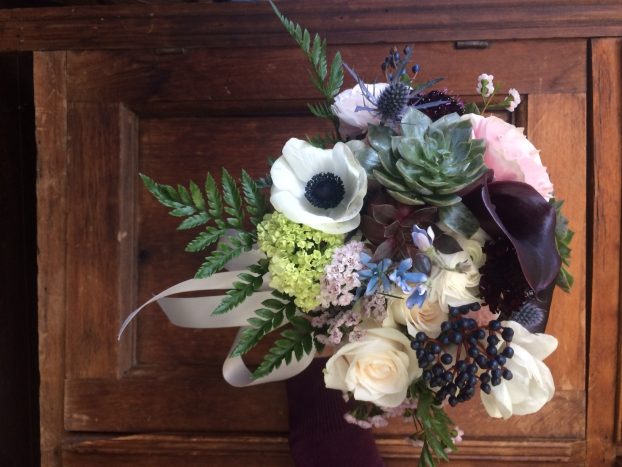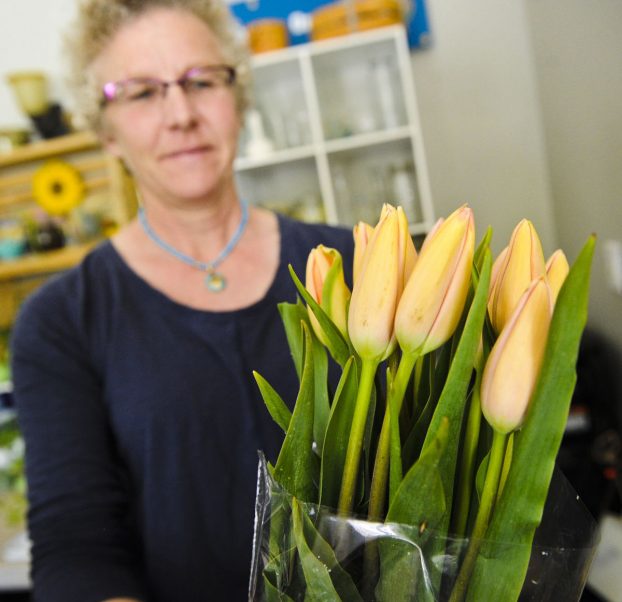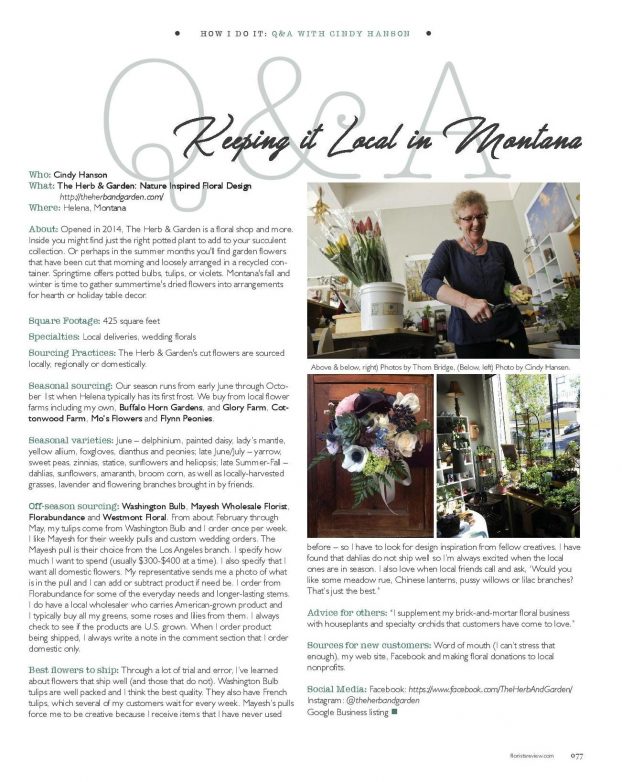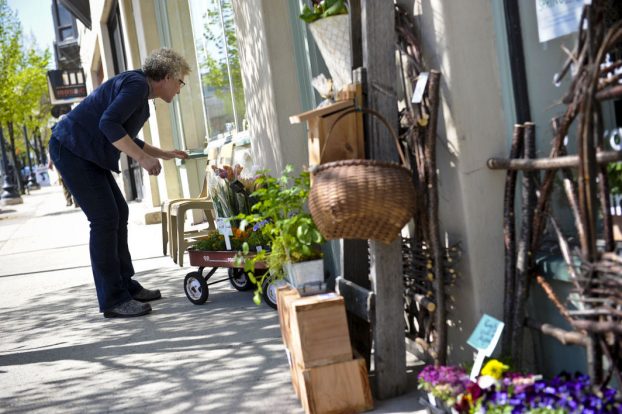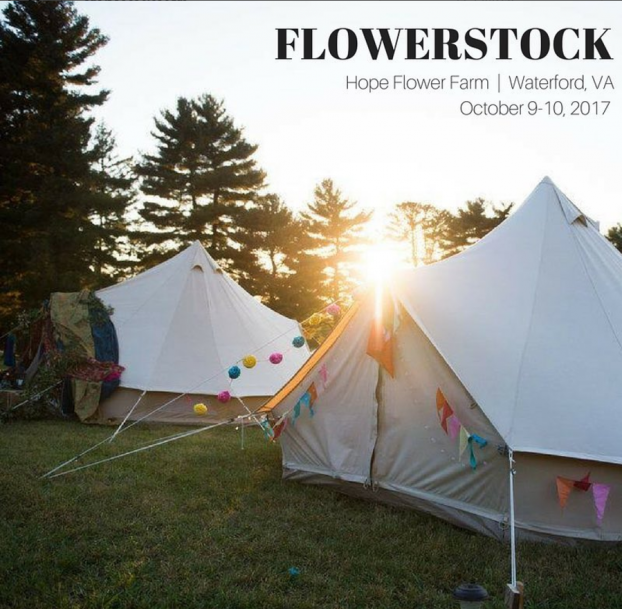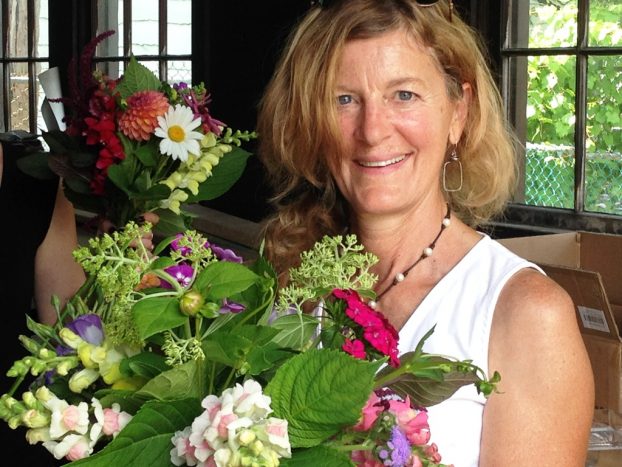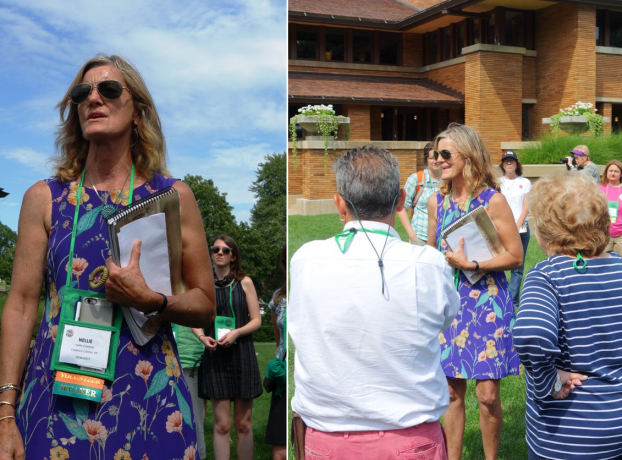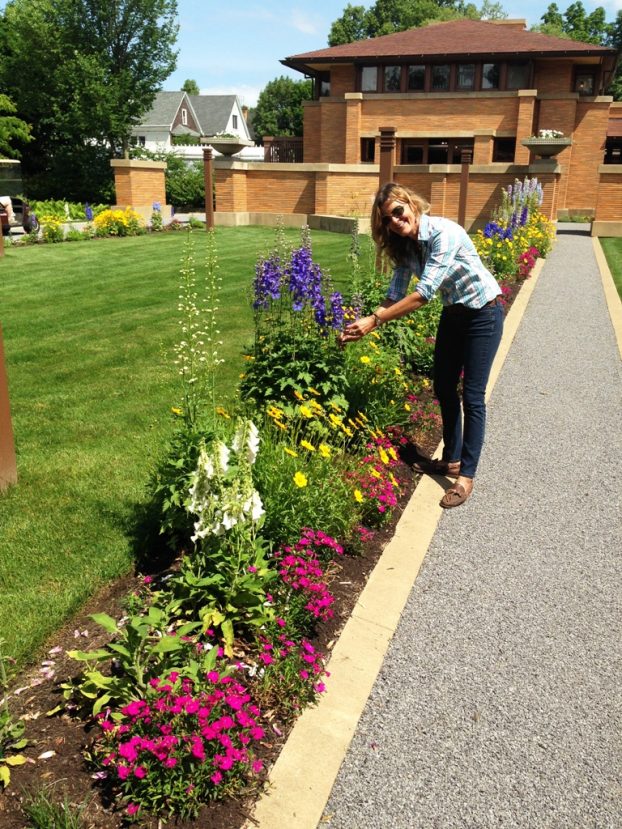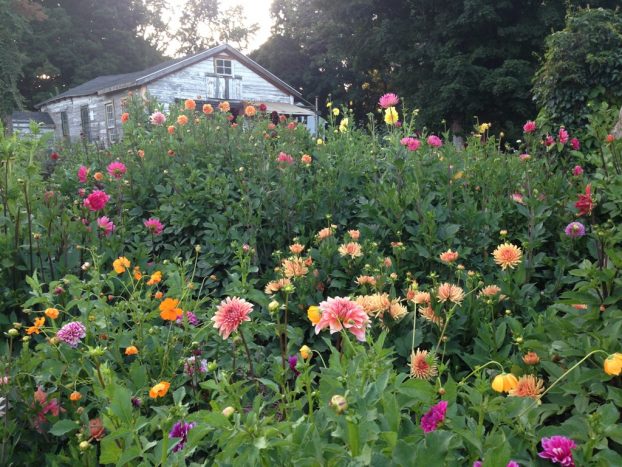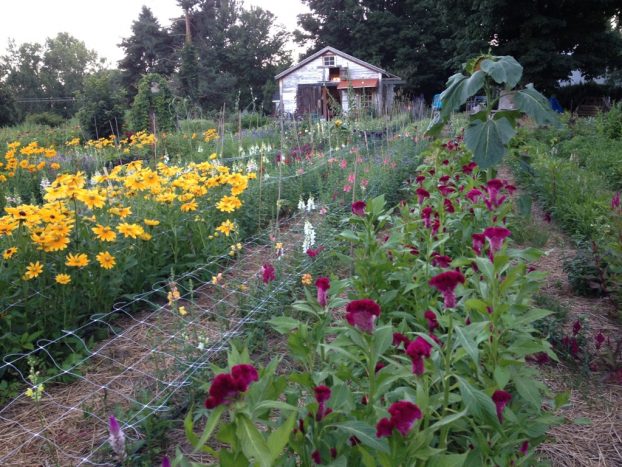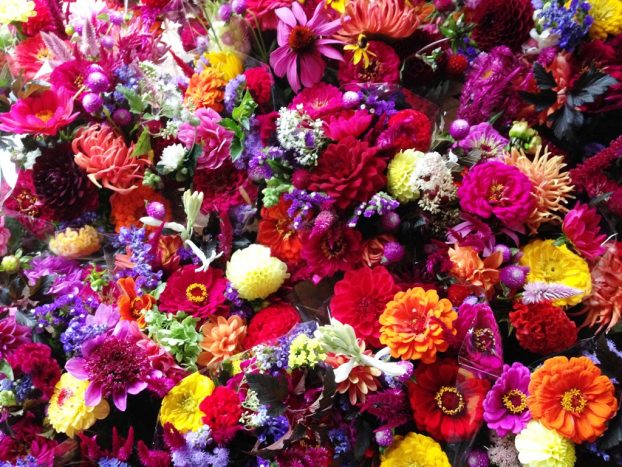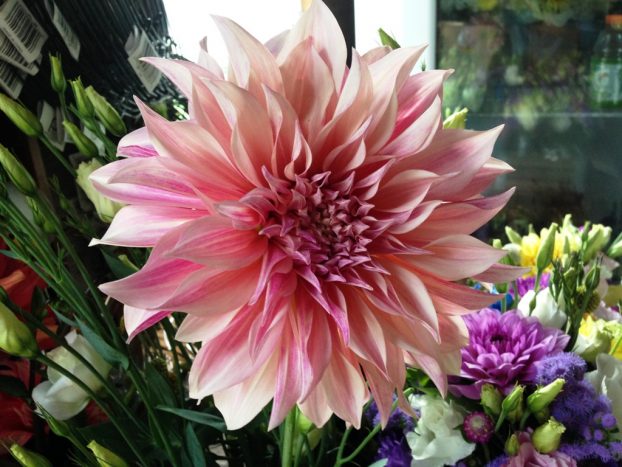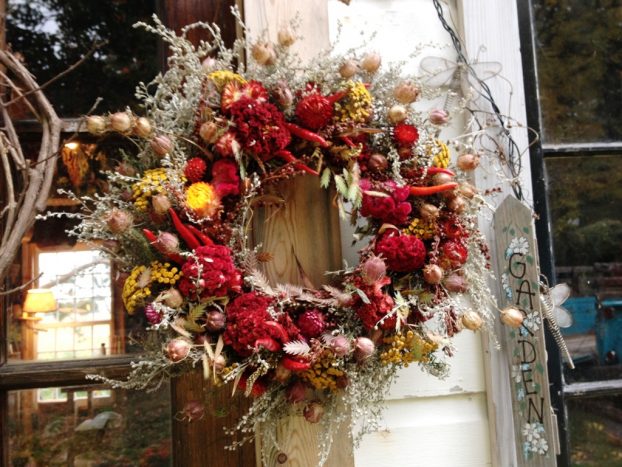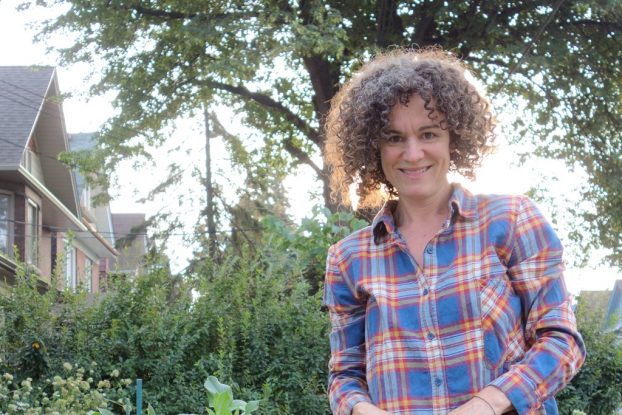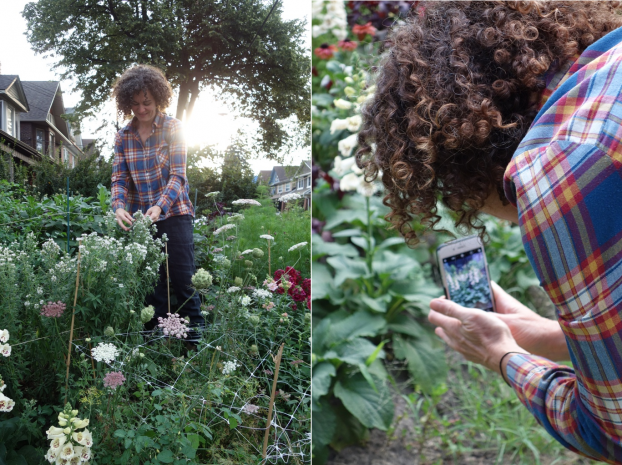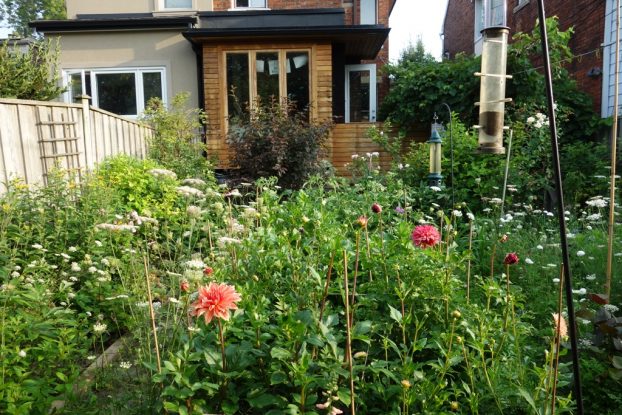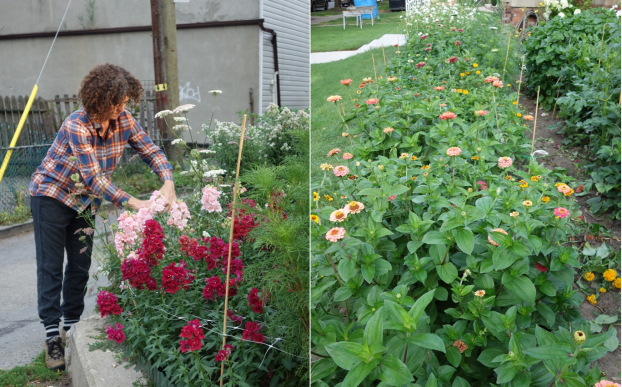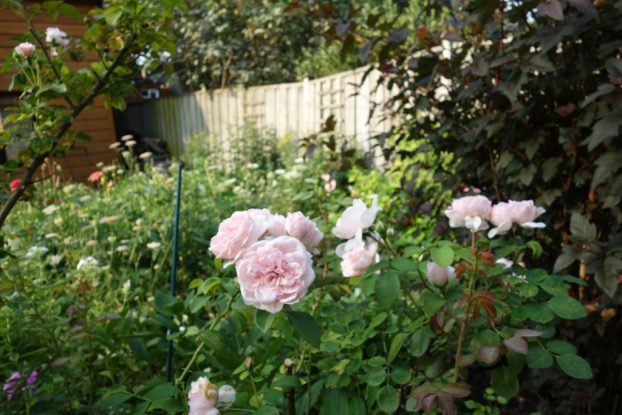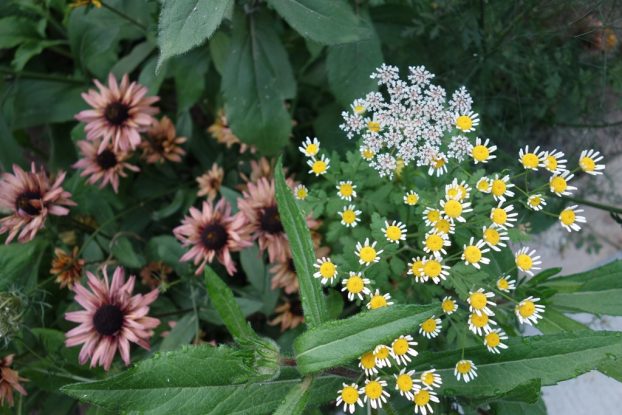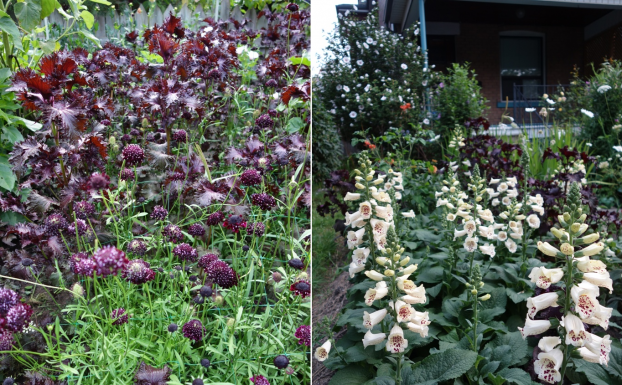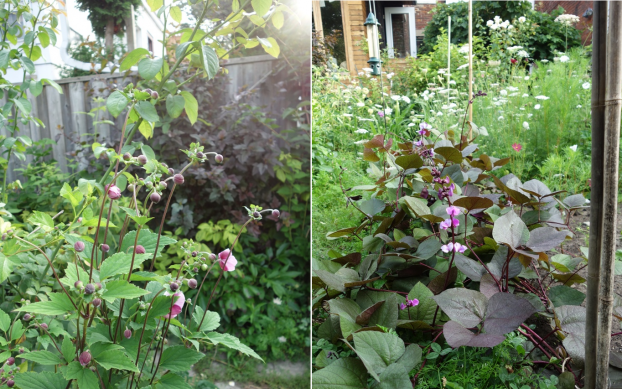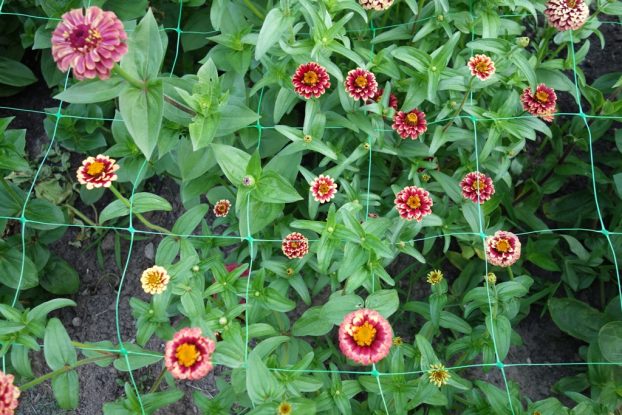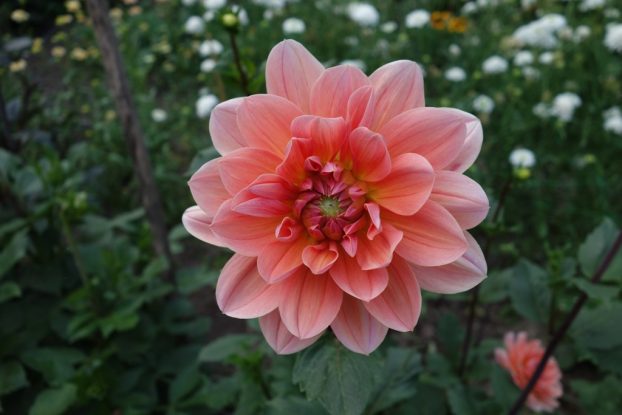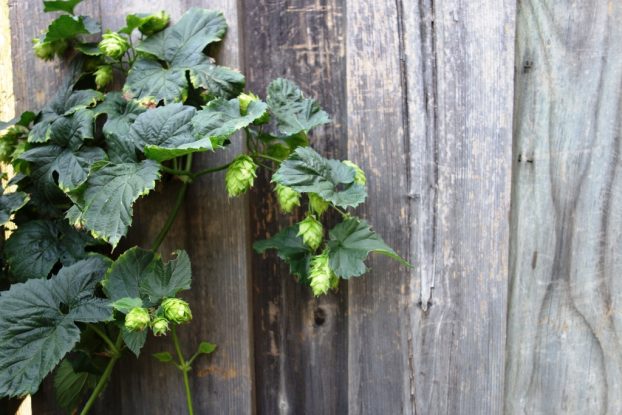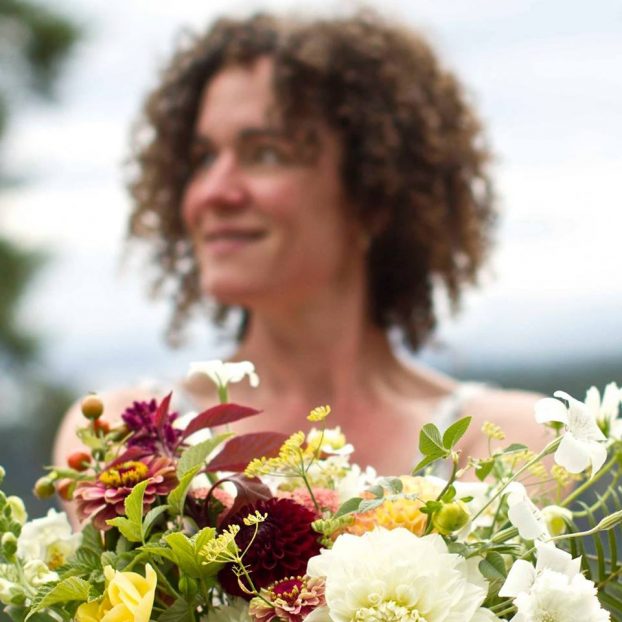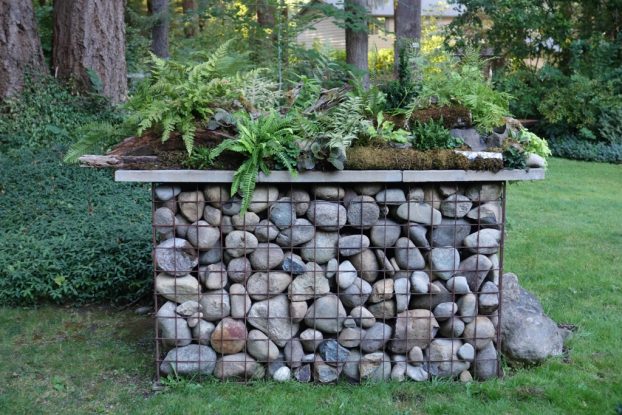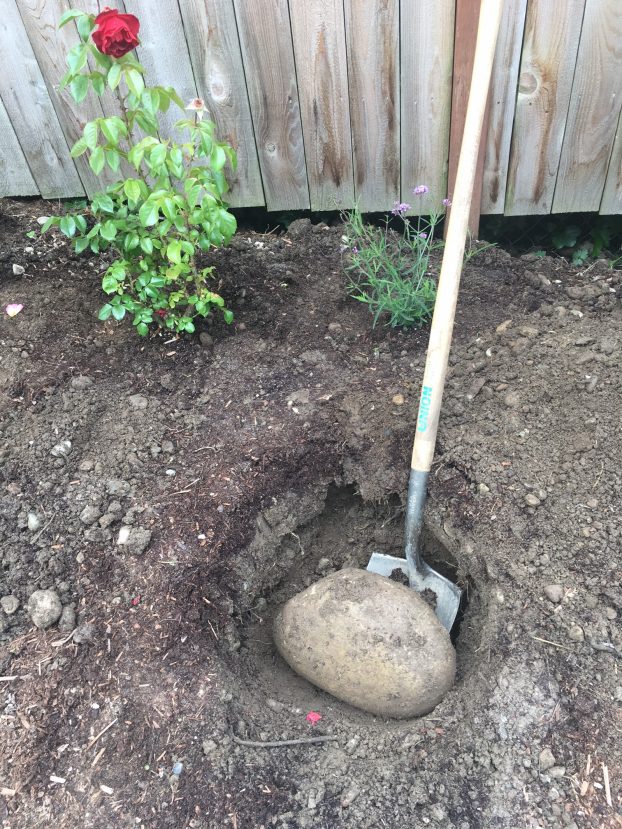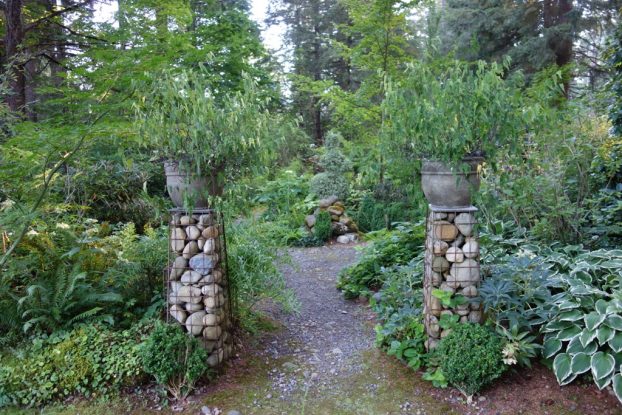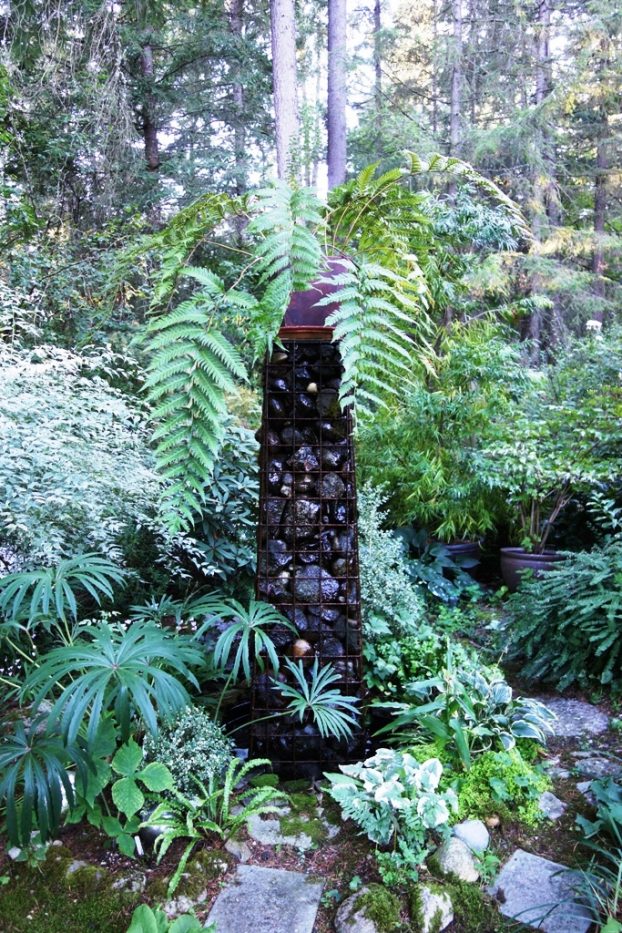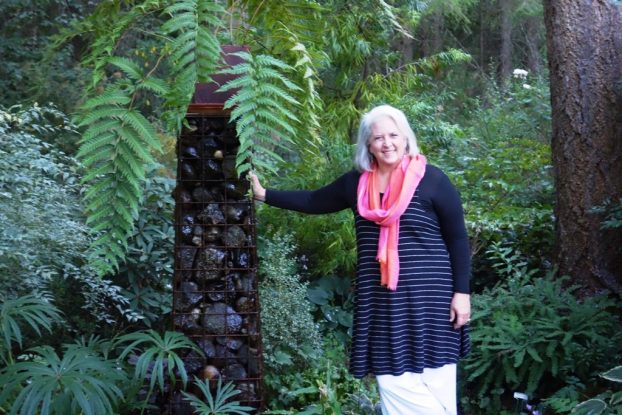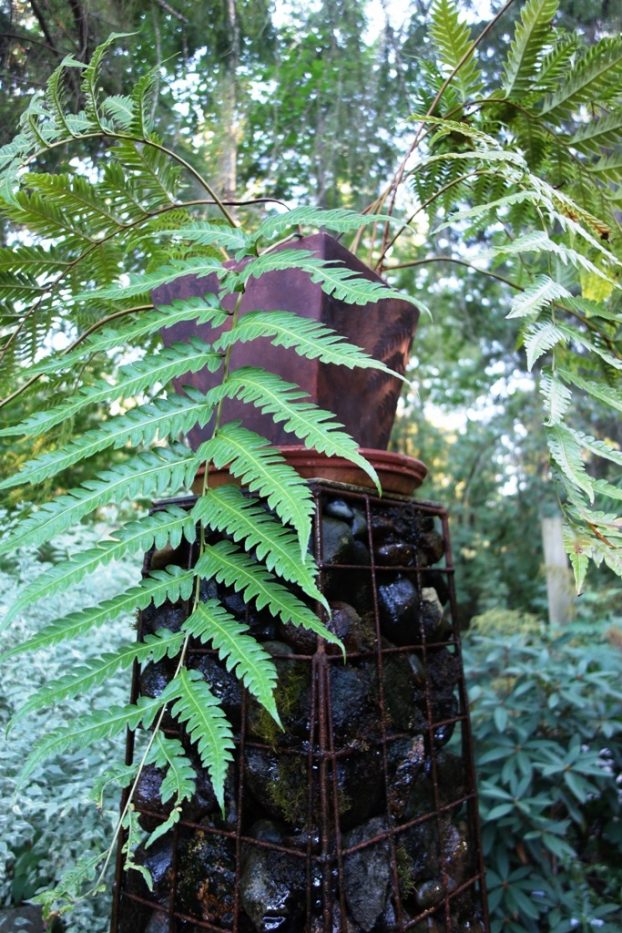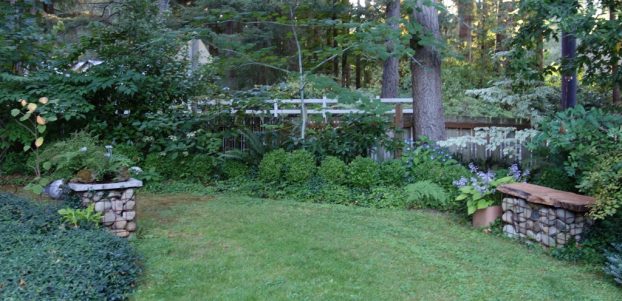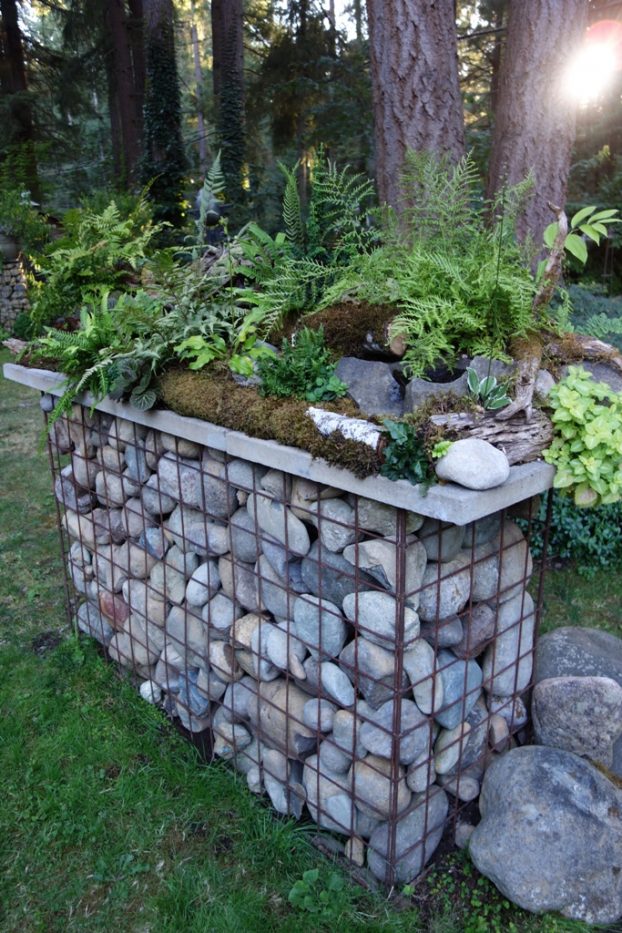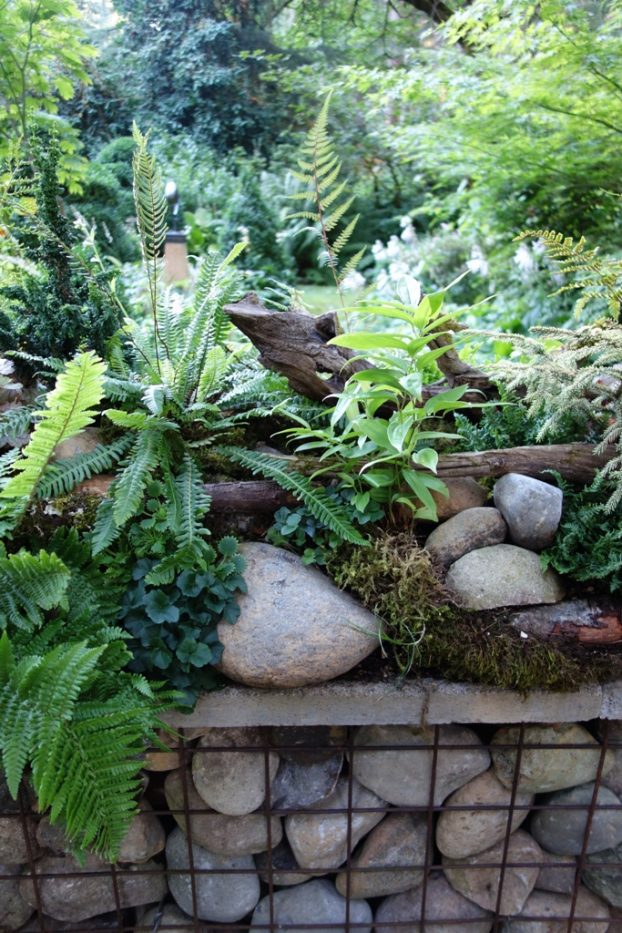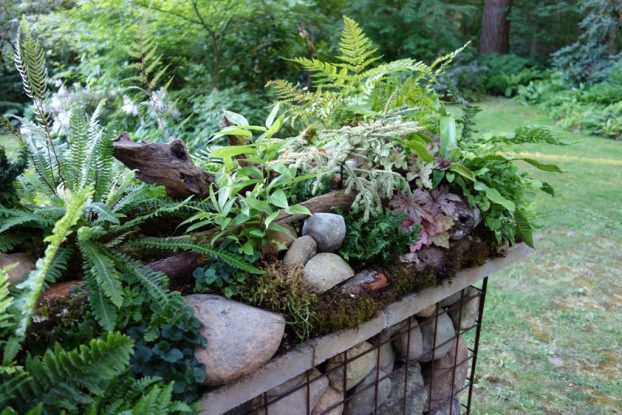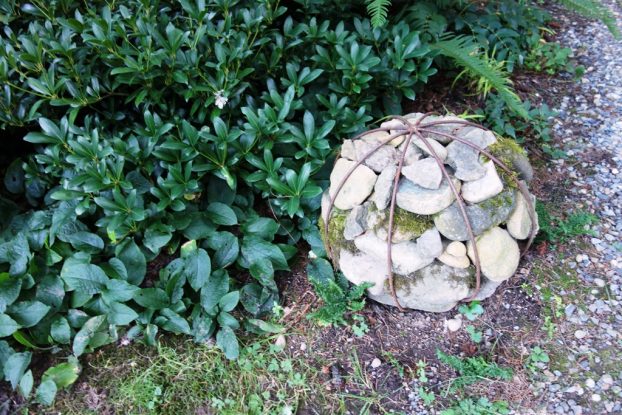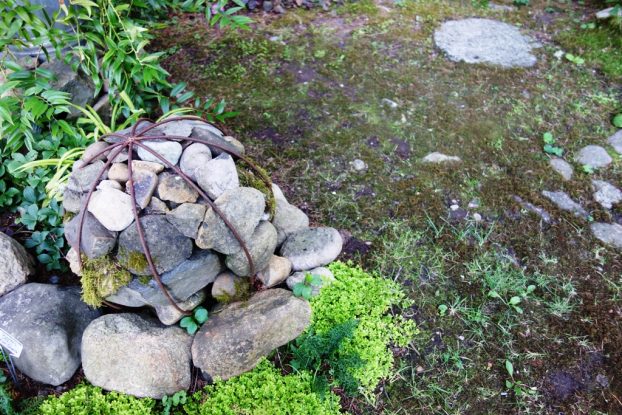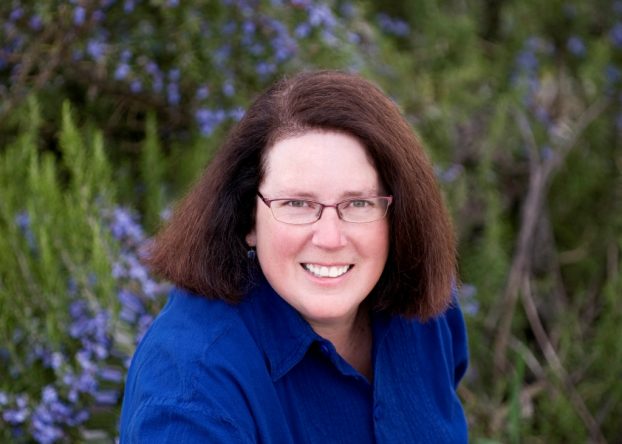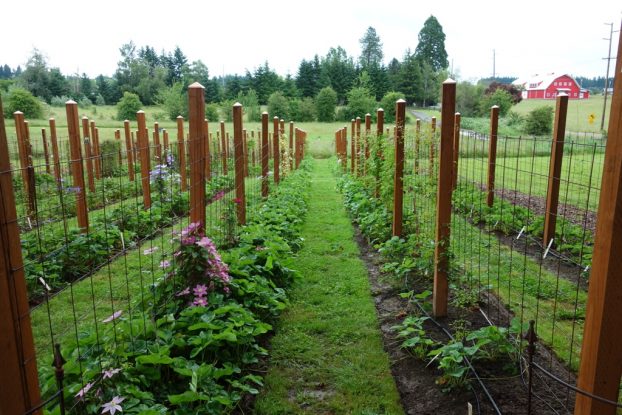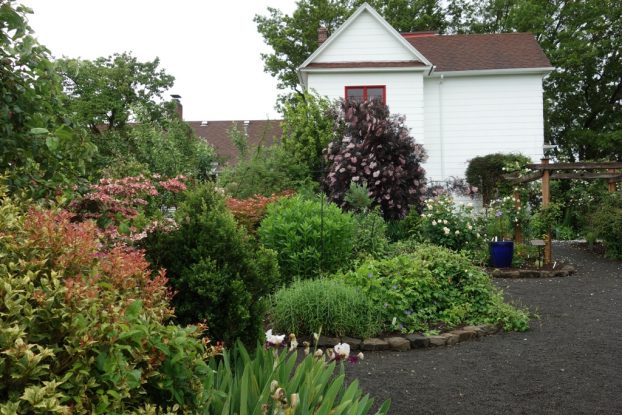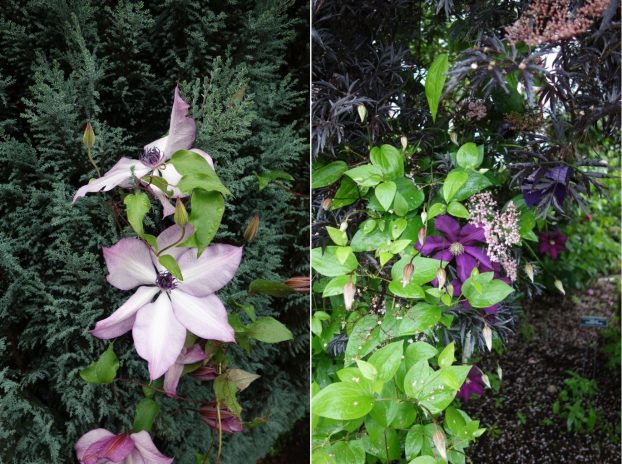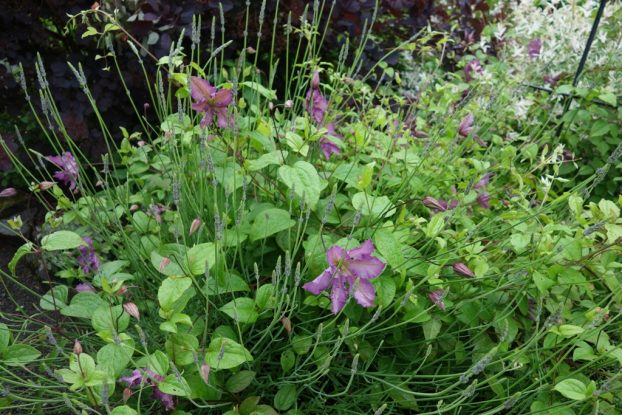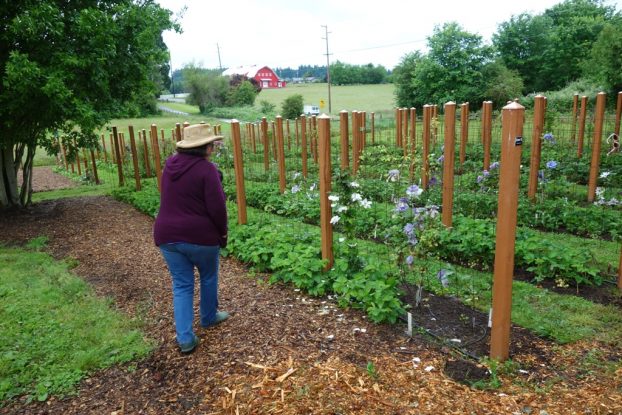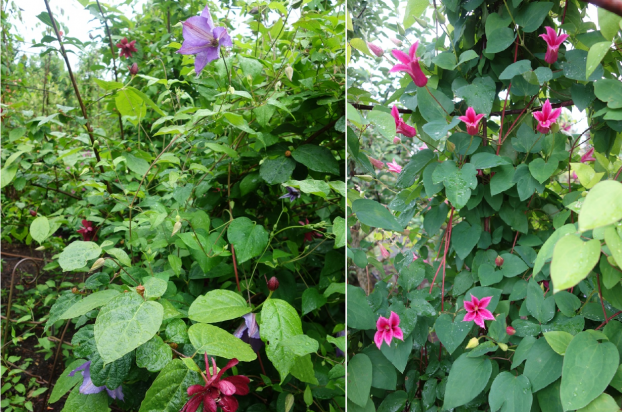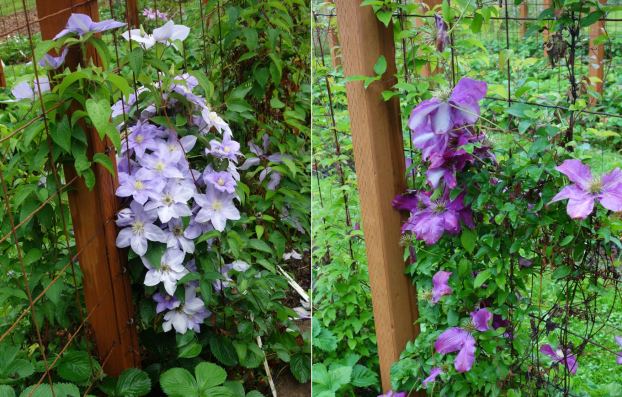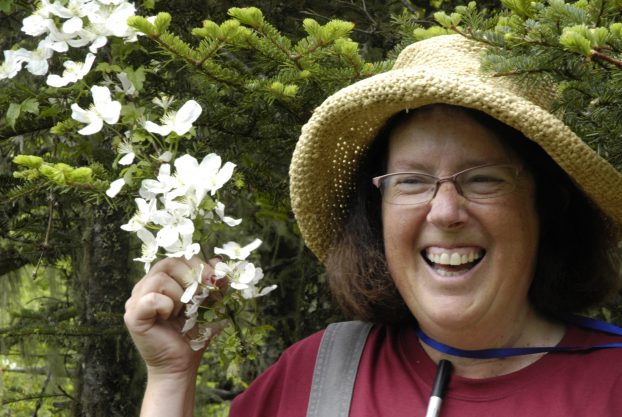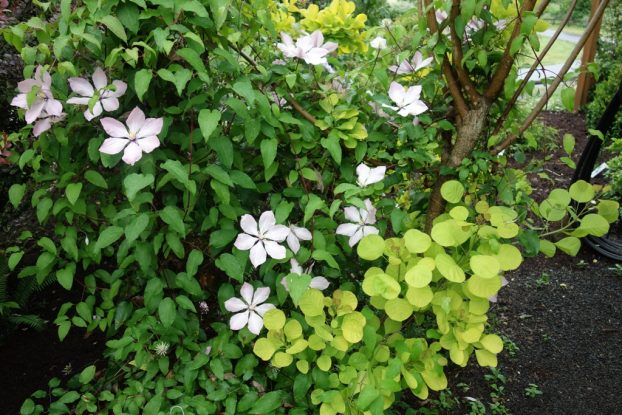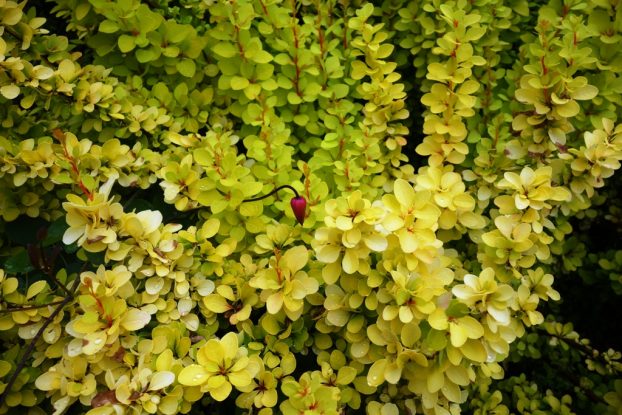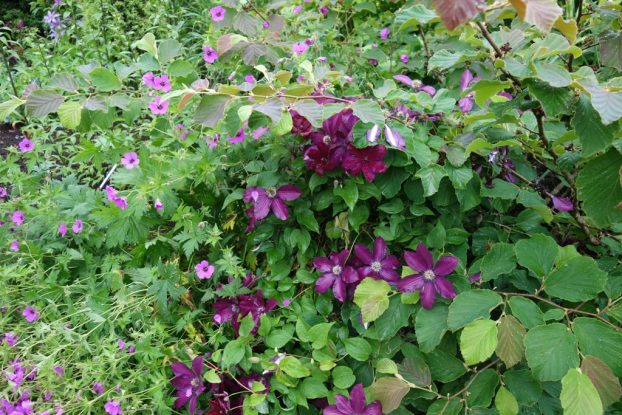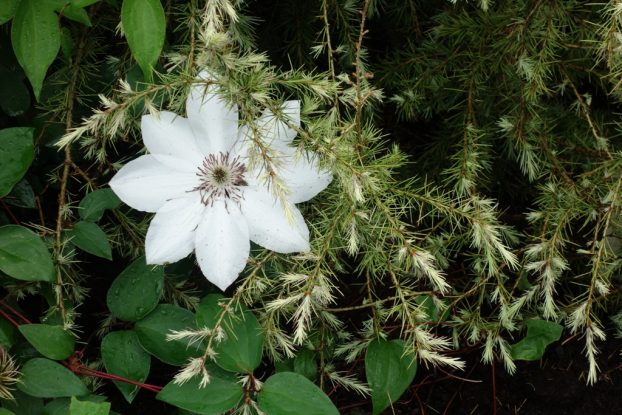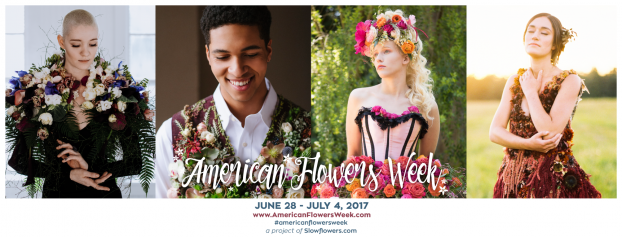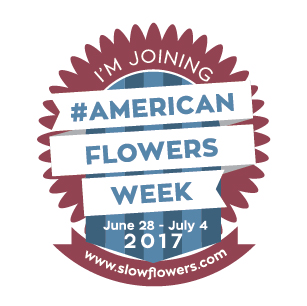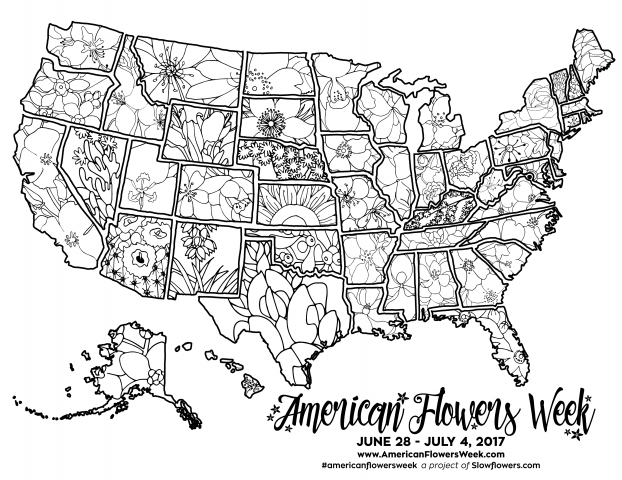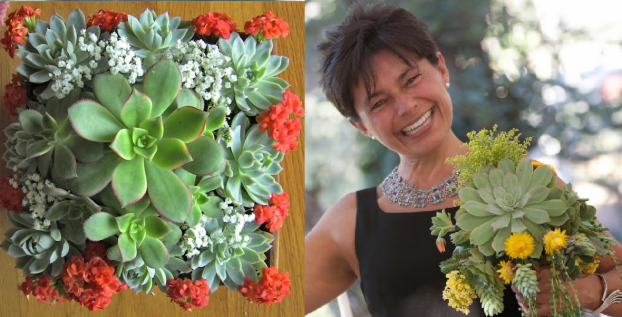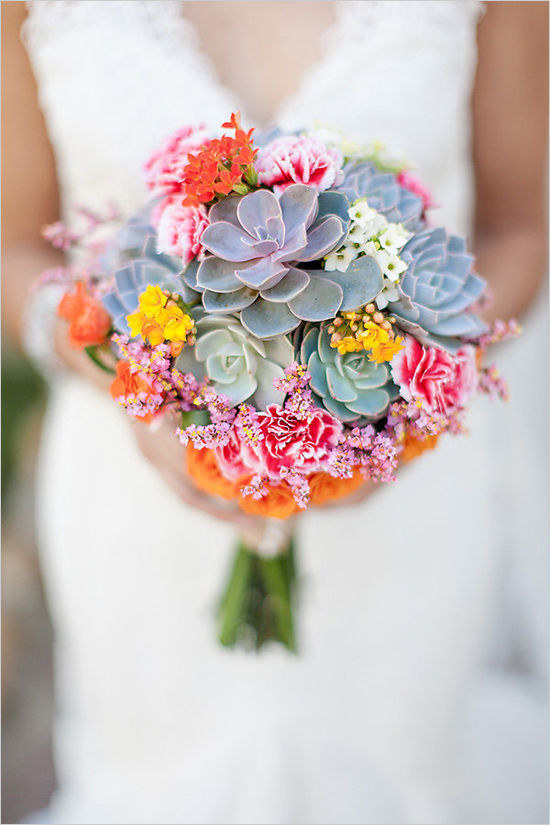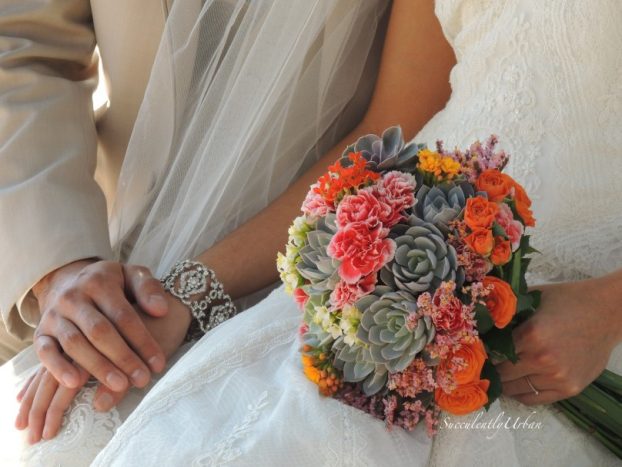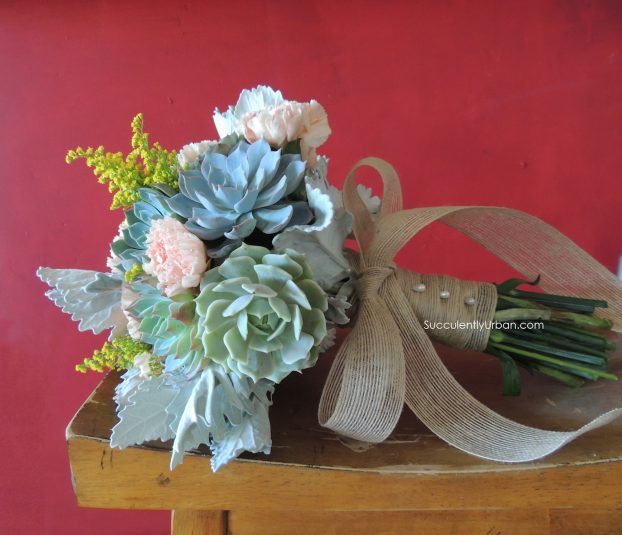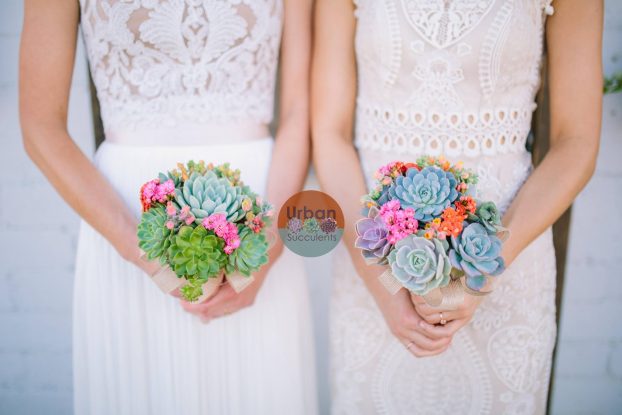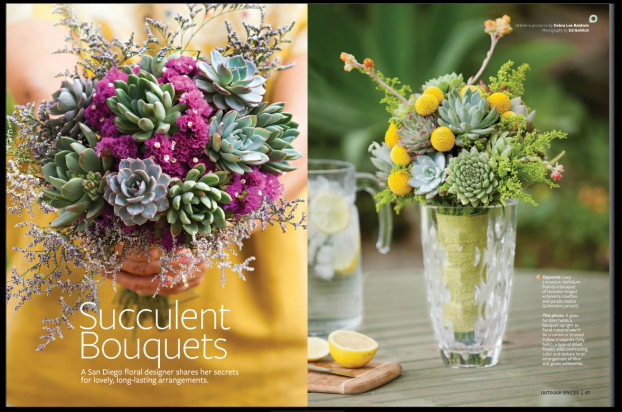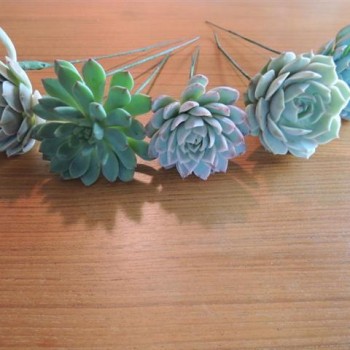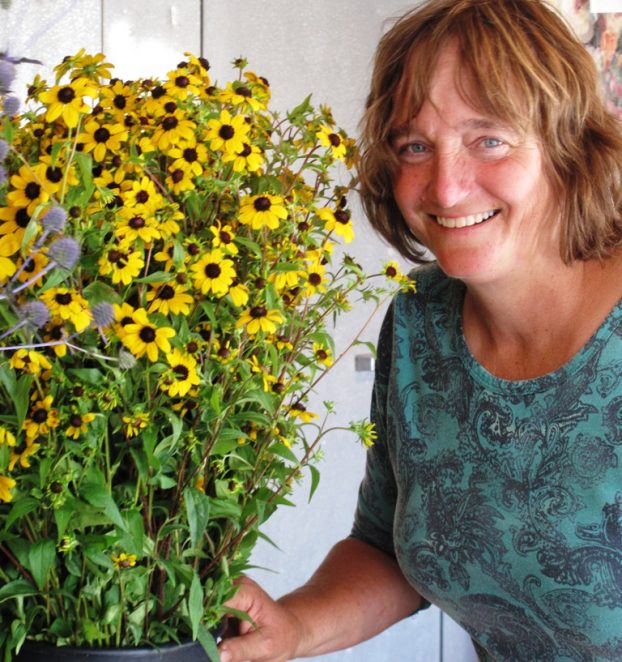
Janet Foss, veteran specialty cut flower farmer and lifelong plantswoman.
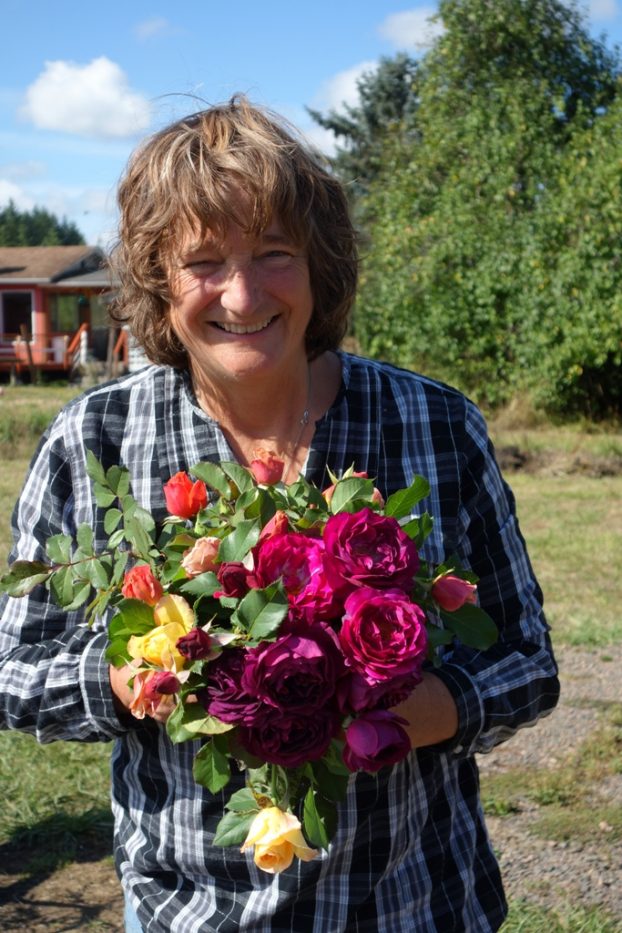
I visited Janet in September on harvest day. Here she is with an armload of beautiful garden roses!
I’m so happy today to feature my recent interview with Janet Foss of J. Foss Garden Flowers, based in Onalaska, Washington, a community located halfway between Seattle and Portland.
Janet Foss has spent more than 30 years in flower farming, but her passion began when she was 10 years old. “I remember asking for my own flower bed,” Janet recalls. “My grandmother was a cut flower grower and florist – it’s a big thing in our family.”
As an adult, Janet and her husband Jim first raised unusual garden flowers on a 20-acre farm in Everett; since 2003, they have farmed on 40 acres in Onalaska, alongside the Newaukum River, with 5-plus acres specifically dedicated to field-grown, green house and high tunnel production.
Her natural ability to grow things has paid off, as Janet is known in flower farming circles as an expert in heirloom chrysanthemums.
For several years, Janet popularized vintage varieties of specialty mums through a mail-order venture.
After selling that business to another grower, Janet now focuses exclusively on raising uncommon cut flowers.
“Something different” is her guiding principle when it comes to choosing which crops to grow. “We specialize in high-quality flowers that are different and unusual from the standard garden flowers normally available.”
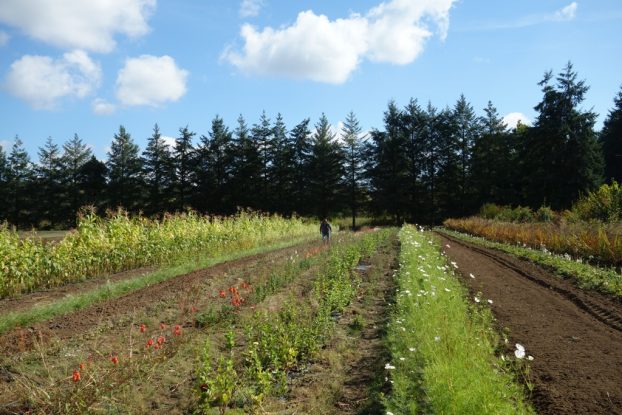
The beautiful setting for J. Foss Garden Flowers, in southwest Washington State.
That includes 3,000 dahlias and rare pussy willows and more than 200 varieties of flowers and floral ingredients, including astrantia, calla lilies, campanula, cosmos, delphinium, garden roses, gentiana, grasses, hypericum, lady’s mantle, ninebark, ornamental wheat, pussy willow, saponaria, scabiosa, sunflowers, sweet peas and zinnias.

Janet with her famous dahlias!
Janet regularly sells at her stall inside the Oregon Flower Growers Association, which is located at the Portland Flower Market. In Seattle, you can find her seasonal offerings at Northwest Wholesale Flowers. She was a founding member of the Seattle Wholesale Growers Market in 2011.
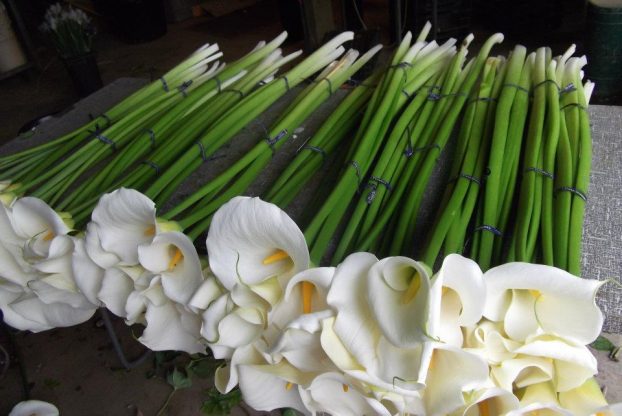
Calla lilies have been in Janet’s family for more than 50 years, originating from her grandmother’s cutting garden.
Here’s more background from the “about” page of J. Foss Garden Flowers:
We started our farm in 1981, a few days after we were married. Jim was a school teacher at the time and had the summer free; I needed to go back to work. The day I went back to work, he went to town and got the business license and signed us up for the farmers market. I had been gardening all my life. Jim was a city boy, and gardening seemed like a big expense which he felt would never be recovered. I told him we could make money selling at farmers markets, he took me seriously. The first item on his agenda was to put this garden to work making money. He has never been a procrastinator, without him I would still be thinking about getting a business license. Our first farm, close to the Everett, WA city limits, was only about an acre. We sold at the farmers market, did custom picking for local customers, and had a florist who bought most of what we grew.
We were really enjoying growing flowers, so next we bought 20 acres in the Snohomish Valley. It was all sub-irrigated, was awesome soil, and grew beautiful cut flowers. We specialized in plants that loved damp peaty soil, like the Giant White Calla. We soon became know for the Callas, although we also grew dahlias, pussywillows, cosmos, Queen Anne’s Lace, and many other unusual cut flowers.
The circumstances of life often change, and the need for us to change occured after Jim suffered a stoke in 1998. It became clear that life would be simpler in order to be closer to family, so we moved south back to my roots in Lewis County Washington. We found a beautiful field near Onalaska, WA, on the Newaukum River. We purchased this land in 2001 and started shaping it into our current farm. Giant White Calla are still our specialty, but we are also growing roses, garden flowers, and clematis. We grow over 200 varieties of flowers, and have flowers available most of the year.
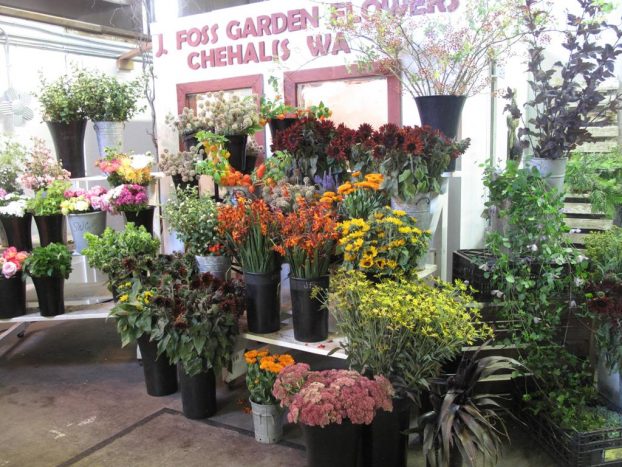
J. Foss Garden Flowers’ original booth at Seattle Wholesale Growers Market (2011-2013)
I know you’ll enjoy our conversation and listen for the tale of how Janet and I actually went to college at the same time — as Home Economics majors. I guess all roads lead to flowers, though, because horticulture has been both of our passions long after we gave up the sewing machine and that patternmaking training from college days.
Here’s how you can find Janet Foss at her social places:
J. Foss Garden Flowers on Facebook
J. Foss Garden Flowers on Instagram
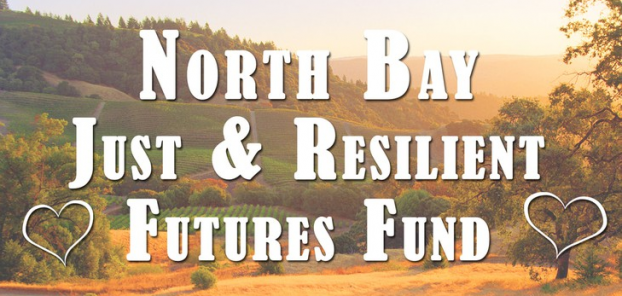 I also want to share an opportunity that might strike a chord with you, as it has with me. So many of us have watched in horror as the wildfires of Northern California, specifically in Sonoma County, have destroyed homes, businesses and agricultural land.
I also want to share an opportunity that might strike a chord with you, as it has with me. So many of us have watched in horror as the wildfires of Northern California, specifically in Sonoma County, have destroyed homes, businesses and agricultural land.
We have a number of Slow Flowers members who have experienced devastating loss and destruction and our hearts go out to them. There are opportunities to support these friends. I’ve seen offers of labor, studio and cooler space, housing and design support crossing the social media channels and I’m inspired to do what I can, as well.
I just learned through Mud Baron, floral activist and educator at Muir Ranch in Pasadena, California, that there is a ‘Just and Resilient Futures Fund’ in the works, as part of the Community Alliance with Family Farmers, a nonprofit agency.
A diverse coalition of community-based organizations has established the campaign; resources from this fund will be provided to victims of fires, especially those suffering losses not covered by insurance or traditional relief services, and to support initiatives that build more just, healthy, and resilient communities and that better prepare us for future catastrophe.
As Mud posted on his Facebook feed, “because so many farmers lost so much in the 🔥 🔥 🔥#sonomafire, this mad farmer with pruners and an iPhone is raising funds to help the rebuilding efforts at Oak Hill Farm, Flatbed Farm and Let’s Go! Farm via @thefarmersguild”
Follow this link to make a contribution online. When you donate, @bakercreekseeds will match gifts up to $1k.
Thanks for getting the word out, Mud!
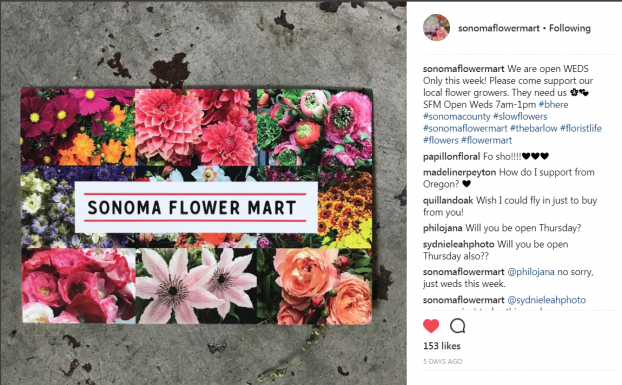
Sonoma Flower Mart’s recent Instagram Post
I also want to give a heartfelt shout-out to Nichole Skalski and Kathrin Green of the Sonoma Flower Mart, what has essentially become the heart and hub of the Slow Flowers community of farmers and florists in the North Bay region. Let’s support North Bay flower farmers by buying their flowers!
 Our community is strong and resilient — and we are driven by the essential vision of supporting the vibrant domestic floral marketplace. Thanks for being part of this movement.
Our community is strong and resilient — and we are driven by the essential vision of supporting the vibrant domestic floral marketplace. Thanks for being part of this movement.
The Slow Flowers Podcast has been downloaded more than 247,000 times by listeners like you. Thank you to each one of you for downloading, listening, commenting and sharing. It means so much.
If you value the content you receive each week, I invite you to show your thanks and support the Slow Flowers Podcast with a donation — the button can be found on our home page in the right column. Your contributions will help make it possible to transcribe future episodes of the Podcast.
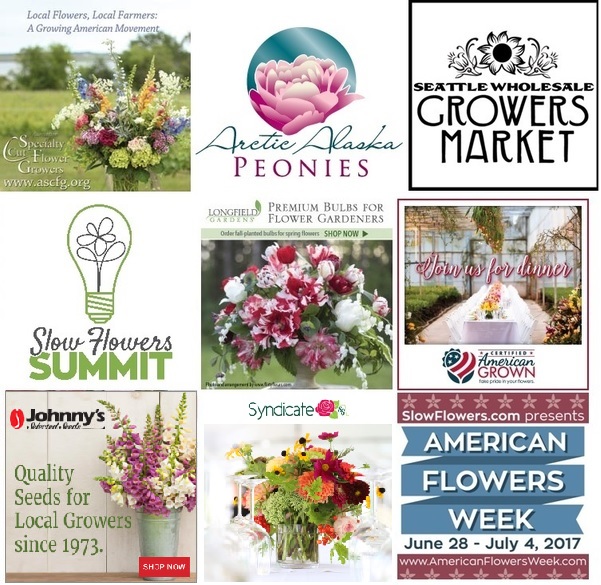 Thank you to family of sponsors
Thank you to family of sponsors
Certified American Grown Flowers. The Certified American-Grown program and label provide a guarantee for designers and consumers on the source of their flowers. Take pride in your flowers and buy with confidence, ask for Certified American Grown Flowers. To learn more visit americangrownflowers.org.
Arctic Alaska Peonies, a cooperative of 50 family farms in the heart of Alaska providing high quality, American Grown peony flowers during the months of July and August. Visit them today at arcticalaskapeonies.com
Seattle Wholesale Growers Market, a farmer-owned cooperative committed to providing the very best the Pacific Northwest has to offer in cut flowers, foliage and plants. The Growers Market’s mission is to foster a vibrant marketplace that sustains local flower farms and provides top-quality products and service to the local floral industry. Find them at seattlewholesalegrowersmarket.com
Longfield Gardens provides home gardeners with high quality flower bulbs and perennials. Their online store offers plants for every region and every season, from tulips and daffodils to dahlias, caladiums and amaryllis. Visit them at lfgardens.com.
Syndicate Sales, an American manufacturer of vases and accessories for the professional florist. Look for the American Flag Icon to find Syndicate’s USA-made products and join the Syndicate Stars loyalty program at syndicatesales.com.
Johnny’s Selected Seeds, an employee-owned company that provides our industry the best flower, herb and vegetable seeds — supplied to farms large and small and even backyard cutting gardens like mine. Check them out at johnnysseeds.com.
Association of Specialty Cut Flower Growers. Formed in 1988, ASCFG was created to educate, unite, and support commercial cut flower growers. It mission is to help growers produce high-quality floral material, and to foster and promote the local availability of that product. Learn more at ascfg.org
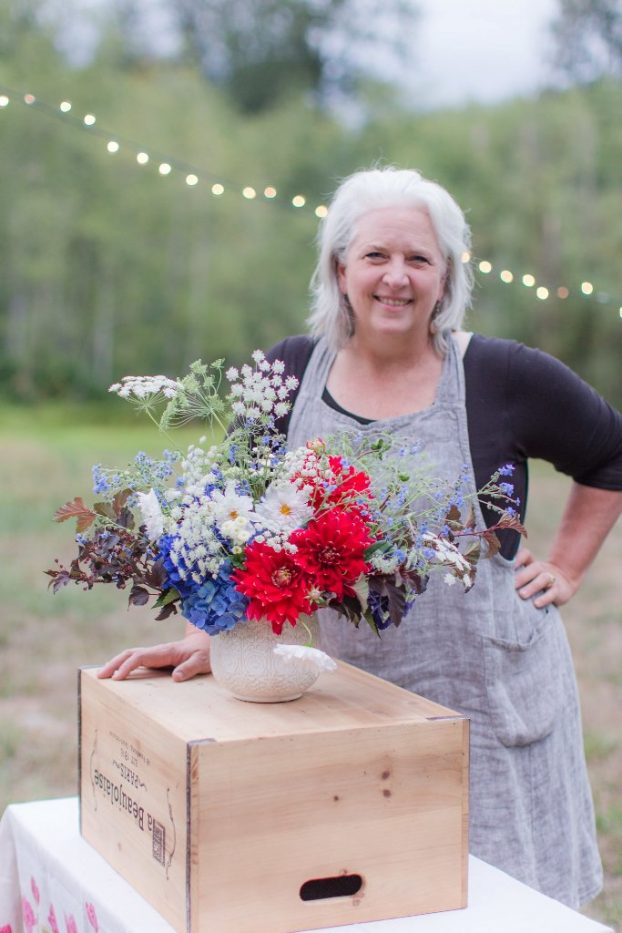
(c) Missy Palacol Photography
I’m Debra Prinzing, host and producer of the Slow Flowers Podcast. Next week, you’re invited to join me in putting more American grown flowers on the table, one vase at a time. And If you like what you hear, please consider logging onto Itunes and posting a listener review.
The content and opinions expressed here are either mine alone or those of my guests alone, independent of any podcast sponsor or other person, company or organization.
The Slow Flowers Podcast is engineered and edited by Andrew Brenlan. Learn more about his work at KineticTreeFitness.com.
Music credits:
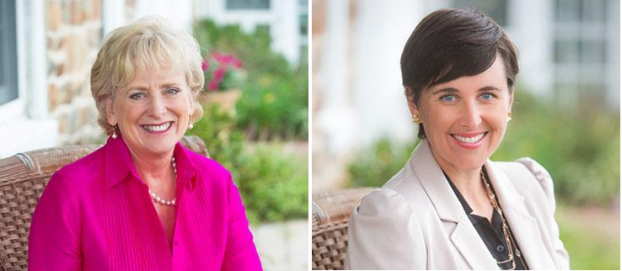
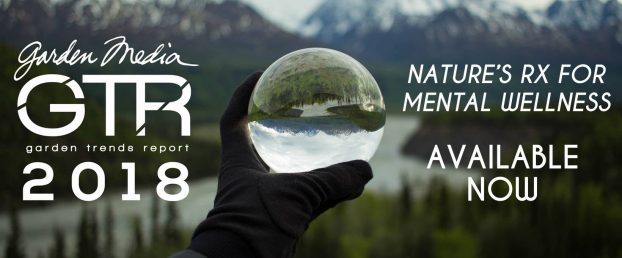 Based outside Philadelphia, Garden Media Group was one of the very first marketing and communications firms to position itself in the “green” category. For many years, Garden Media Group has released an annual Garden Trends Report, which has become a must-have reference for writers, practitioners and companies in the gardening industry.
Based outside Philadelphia, Garden Media Group was one of the very first marketing and communications firms to position itself in the “green” category. For many years, Garden Media Group has released an annual Garden Trends Report, which has become a must-have reference for writers, practitioners and companies in the gardening industry.